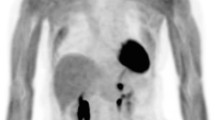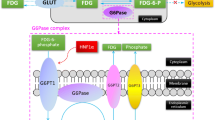Abstract
Fluorine-18 labelled fluoro-2-deoxy-d-glucose (18FDG) positron emission tomography (PET) imaging demonstrates the increased glucose consumption of malignant cells, but problems with specificity have led to the development of new PET tracers. [18F]3'-deoxy-3'-fluorothymidine (18FLT) is a new tracer which images cellular proliferation by entering the salvage pathway of DNA synthesis. In this study we compared the cellular uptake of 18FLT and 18FDG in patients with colorectal cancer (CRC). Seventeen patients with 50 primary or metastatic CRC lesions were prospectively recruited. Lesions were initially identified using computed tomography. Patients underwent both 18FDG and 18FLT scanning. Semi-quantitative analysis of tracer uptake was carried out using standardised uptake values. All the primary tumours (n=6) were visualised by both tracers, with 18FDG showing on average twice the uptake of 18FLT. Similar uptake of both tracers was seen in lung and peritoneal lesions, with 18FLT imaging five of the six lung lesions and all of the peritoneal lesions. Of the 32 colorectal liver metastases, 11 (34%) were seen as avid for 18FLT, compared with 31 (97%) for 18FDG. No correlation was seen between the uptake of the two tracers (R 2=0.03). 18FLT shows a high sensitivity in the detection of extrahepatic disease but poor sensitivity for the imaging of colorectal liver metastases, making it unlikely to have a role as a diagnostic tracer in CRC. We have demonstrated that 18FDG and 18FLT image two distinct processes. The prognostic implications of the uptake of 18FLT need to be assessed in terms of response to chemoradiotherapy and survival.






Similar content being viewed by others
References
Whiteford MH, Whiteford HM, Yee LF, Ogunbiyi OA, Dehdashti F, Siegel BA, Birnbaum EH, Fleshman JW, Kodner IJ, Read TE. Usefulness of FDG-PET scan in the assessment of suspected metastatic or recurrent adenocarcinoma of the colon and rectum. Dis Colon Rectum 2000; 43:759–767.
Kalff V, Hicks RJ, Ware RE, Hogg A, Binns D, McKenzie AF. The clinical impact of (18)F-FDG PET in patients with suspected or confirmed recurrence of colorectal cancer: a prospective study. J Nucl Med 2002; 43:492–499.
Ruers TJ, Langenhoff BS, Neeleman N, Jager GJ, Strijk S, Wobbes T, Corstens FH, Oyen WJ. Value of positron emission tomography with [F-18]fluorodeoxyglucose in patients with colorectal liver metastases: a prospective study. J Clin Oncol 2002; 20:388–395.
Arulampalam TH, Ledermann J, Costa DC. Asymptomatic patient with an increasing concentration of CEA. Lancet Oncol 2001; 2:172.
Libutti SK, Alexander HR Jr, Choyke P, Bartlett DL, Bacharach SL, Whatley M, Jousse F, Eckelman WC, Kranda K, Neumann RD, Carrasquillo JA. A prospective study of 2-[18F] fluoro-2-deoxy-d-glucose/positron emission tomography scan, 99mTc-labeled arcitumomab (CEA-scan), and blind second-look laparotomy for detecting colon cancer recurrence in patients with increasing carcinoembryonic antigen levels. Ann Surg Oncol 2001; 8:779–786.
Hatanaka M. Transport of sugars in tumor cell membranes. Biochim Biophys Acta 1974; 355:77–104.
Flier JS, Mueckler MM, Usher P, Lodish HF. Elevated levels of glucose transport and transporter messenger RNA are induced by ras or src oncogenes. Science 1987; 235:1492–1495.
Hiraki Y, Rosen OM, Birnbaum MJ. Growth factors rapidly induce expression of the glucose transporter gene. J Biol Chem 1988; 263:13655–13662.
Huebner RH, Park KC, Shepherd JE, Schwimmer J, Czernin J, Phelps ME, Gambhir SS. A meta-analysis of the literature for whole-body FDG PET detection of recurrent colorectal cancer. J Nucl Med 2000; 41:1177–1189.
Kubota R, Yamada S, Kubota K, Ishiwata K, Tamahashi N, Ido T. Intratumoral distribution of fluorine-18-fluorodeoxyglucose in vivo: high accumulation in macrophages and granulation tissues studied by microautoradiography. J Nucl Med 1992; 33:1972–1980.
Bakheet SM, Powe J, Kandil A, Ezzat A, Rostom A, Amartey, J. F-18 FDG uptake in breast infection and inflammation. Clin Nucl Med 2000; 25:100–103.
Shreve PD. Focal fluorine-18 fluorodeoxyglucose accumulation in inflammatory pancreatic disease. Eur J Nucl Med 1998; 25:259–264.
Shreve PD, Anzai Y, Wahl RL. Pitfalls in oncologic diagnosis with FDG PET imaging: physiologic and benign variants. Radiographics 1999; 19:61–77.
Vijayalakshmi D, Belt JA. Sodium-dependent nucleoside transport in mouse intestinal epithelial cells. Two transport systems with differing substrate specificities. J Biol Chem 1988; 263:19419–19423.
Eary JF, Mankoff DA, Spence AM, Berger MS, Olshen A, Link JM, O'Sullivan F, Krohn KA. 2-[C-11]thymidine imaging of malignant brain tumors. Cancer Res 1999; 59:615–621.
Shields AF, Mankoff DA, Link JM, Graham MM, Eary JF, Kozawa SM, Zheng M, Lewellen B, Lewellen TK, Grierson JR, Krohn KA. Carbon-11-thymidine and FDG to measure therapy response. J Nucl Med 1998; 39:1757–1762.
Grierson, JRand Shields, AF. Radiosynthesis of 3'-deoxy-3'-[(18)F]fluorothymidine: [(18)F]FLT for imaging of cellular proliferation in vivo. Nucl Med Biol 2000; 27:143–156.
Machulla HJ, Blocher A, Kuntzch M, Piert M, Wei R, Grierson JR Simplified labeling approach for synthesing 3'-deoxy-3-[18F]fluorothymidine ([18F]FLT). J Radioanal Nucl Chem 2000; 243:843–846.
Martin SJ, Eisenbarth JA, Wagner-Utermann U, Mier W, Haberkorn U, Eisenhut M. [18F]FLT: 18F labeling of 3-Boc-1-(2-deoxy-3-0-nosyl-5-0-titryl-b-d-lyxofuranosyl)thymine and other thymine derivatives [abstract]. J Nucl Med 2000; 41:255.
Coloma J, Castell JV. Isozyme pattern of thymidine kinase during liver regeneration. Hoppe Seylers Z Physiol Chem 1984; 365:457–462.
Nawata H, Kamiya T. Two molecular forms of thymidine kinase in the cytosol of regenerating rat liver. J Biochem (Tokyo) 1975; 78:1215–1224.
Ellims PH, Van Der Weyden MB, Medley G. Thymidine kinase isoenzymes in human malignant lymphoma. Cancer Res 1981; 41:691–695.
Sakamoto S, Iwama T, Ebuchi M, Tsukada K, Sagara T, Kawasaki T, Murakami S, Kasahara N, Kudo H, Okamoto R. Increased activities of thymidine kinase isozymes in human mammary tumours. Br J Surg 1986; 73:272–273.
Sasvari-Szekely M, Staub M, Guttmann A, Torcsvari V, Antoni F. Pyrimidine salvage enzymes in human tonsil lymphocytes. I. Separation and properties of thymidine kinase isoenzymes. Acta Biochim Biophys Acad Sci Hung 1985; 20:163–172.
Munch-Petersen B, Tyrsted G. Induction of thymidine kinases in phytohaemagglutinin-stimulated human lymphocytes. Biochim Biophys Acta 1977; 478:364–375.
Sakamoto S, Iwama T, Tsukada K, Utsunomiya J, Kawasaki T, Okamoto R. Increased activity of thymidine kinase isozyme in human colon tumor. Carcinogenesis 1984; 5:183–185.
Sakamoto S, Sagara T, Iwama T, Kawasaki T, Okamoto R. Increased activities of thymidine kinase isozymes in human colon polyp and carcinoma. Carcinogenesis 1985; 6:917–919.
Sakamoto S, Kasahara N, Kudo H, Iwama T. Effects of carcinogenesis on colonic thymidine kinase activity in familial adenomatous polyposis. Carcinogenesis 1992; 13:873–876.
Hamacher K, Coenen HH, Stocklin G. Efficient stereospecific synthesis of no-carrier-added 2-[18F]-fluoro-2-deoxy-d-glucose using aminopolyether supported nucleophilic substitution. J Nucl Med 1986; 27:235–238.
Cleij MC, Steel CJ, Brady F, Ell PJ, Pike VW, Luthra SK. An improved synthesis of 3-deoxy-3-[18F]fluorothymidine. J Lab Comp Radiopharm 2001; 44.
Visvikis D, Francis DL, Costa DC, Mulligan R, Townsend C, Taylor I, Ell PJ. Quantitative comparison of18FDG and 18FLT in colorectal carcinoma [abstract]. Eur J Nucl Med Mol Imaging 2002; 29:S79.
Visvikis D, Costa DC, Croasdale I, Lonn AHR, Bomanji J, Ell PJ. CT-based attenuation correction in the calculation of semi-quantitative indices of [18F]FDG uptake in PET. Eur J Nucl Med Mol Imaging 2003; 30:344–353.
Shields AF, Grierson JR, Dohmen BM, Machulla HJ, Stayanoff JC, Lawhorn-Crews JM, Obradovich JE, Muzik O, Mangner TJ. Imaging proliferation in vivo with [F-18]FLT and positron emission tomography. Nat Med 1998; 4:1334–1336.
Kubota K. From tumor biology to clinical PET: a review of positron emission tomography (PET) in oncology. Ann Nucl Med 2001; 15:471–486.
Higashi K, Clavo AC, Wahl RL. Does FDG uptake measure proliferative activity of human cancer cells? In vitro comparison with DNA flow cytometry and tritiated thymidine uptake. J Nucl Med 1993; 34:414–419.
Buck AC, Schirrmeister HH, Guhlmann CA, Diederichs CG, Shen C, Buchmann I, Kotzerke J, Birk D, Mattfeldt T, Reske SN. Ki-67 immunostaining in pancreatic cancer and chronic active pancreatitis: does in vivo FDG uptake correlate with proliferative activity? J Nucl Med 2001; 42:721–725.
Buck AK, Schirrmeister H, Hetzel M, Von Der Heide M, Halter G, Glatting G, Mattfeldt T, Liewald F, Reske SN, Neumaier B. 3-deoxy-3-[(18)F]fluorothymidine-positron emission tomography for noninvasive assessment of proliferation in pulmonary nodules. Cancer Res 2002; 62:3331–3334.
Paley MR, Ros PR. Hepatic metastases. Radiol Clin North Am 1998; 36:349–363.
Slingerland JM, Tannock IF. Cell proliferation and cell death. In: Tannock IF, Hill RP, eds. The basic science of oncology, 3rd edn. New York: McGraw-Hill; 1998:134–165.
Acknowledgement
The authors wish to acknowledge the generous financial support of the Trustees of University College London Hospitals NHS Trust.
Author information
Authors and Affiliations
Corresponding author
Rights and permissions
About this article
Cite this article
Francis, D.L., Visvikis, D., Costa, D.C. et al. Potential impact of [18F]3'-deoxy-3'-fluorothymidine versus [18F]fluoro-2-deoxy-d-glucose in positron emission tomography for colorectal cancer. Eur J Nucl Med Mol Imaging 30, 988–994 (2003). https://doi.org/10.1007/s00259-003-1187-0
Received:
Accepted:
Published:
Issue Date:
DOI: https://doi.org/10.1007/s00259-003-1187-0




